Charles E W Bean, Diaries, AWM38 3DRL 606/250/1 - 1917 - 1937 - Part 10
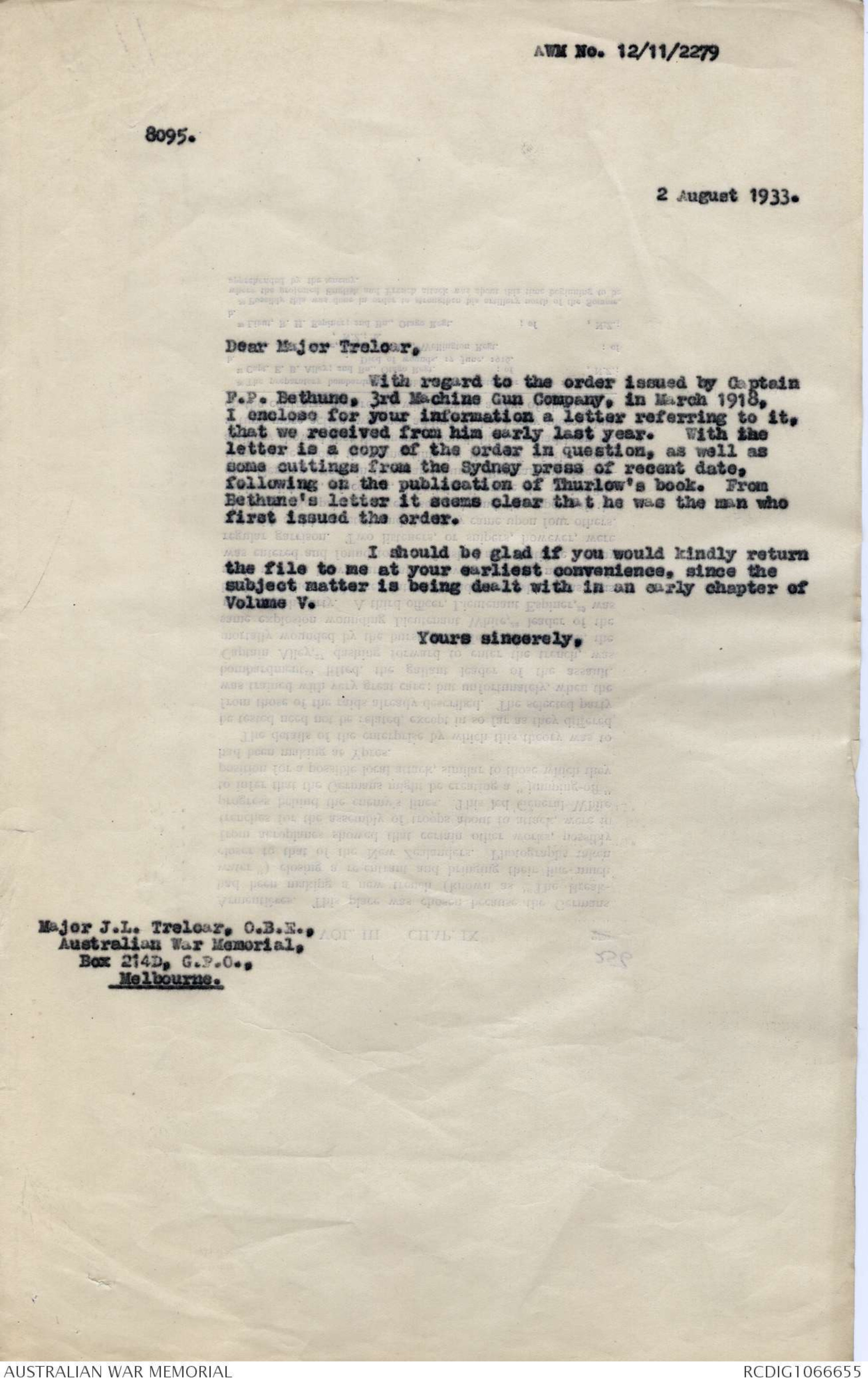
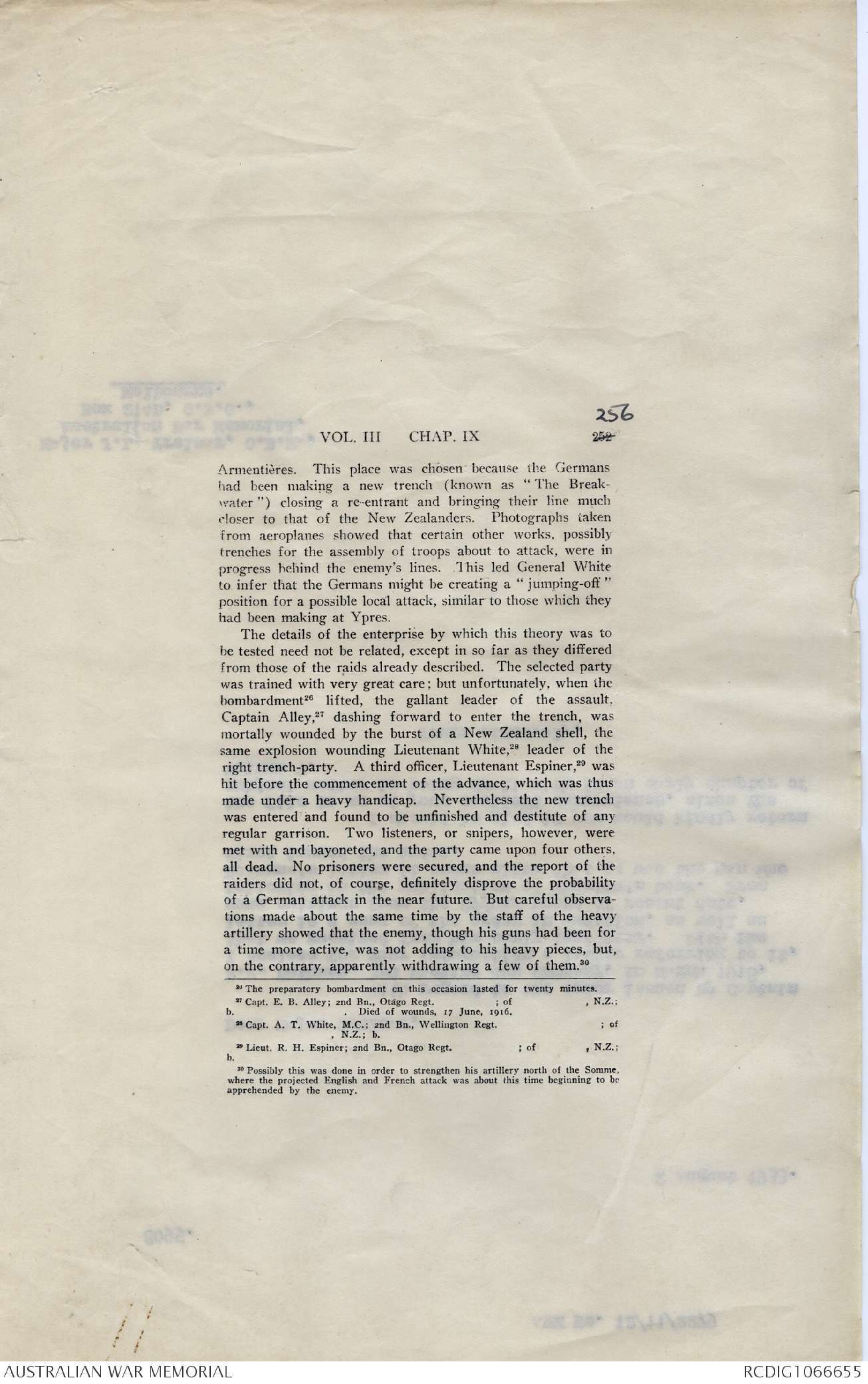
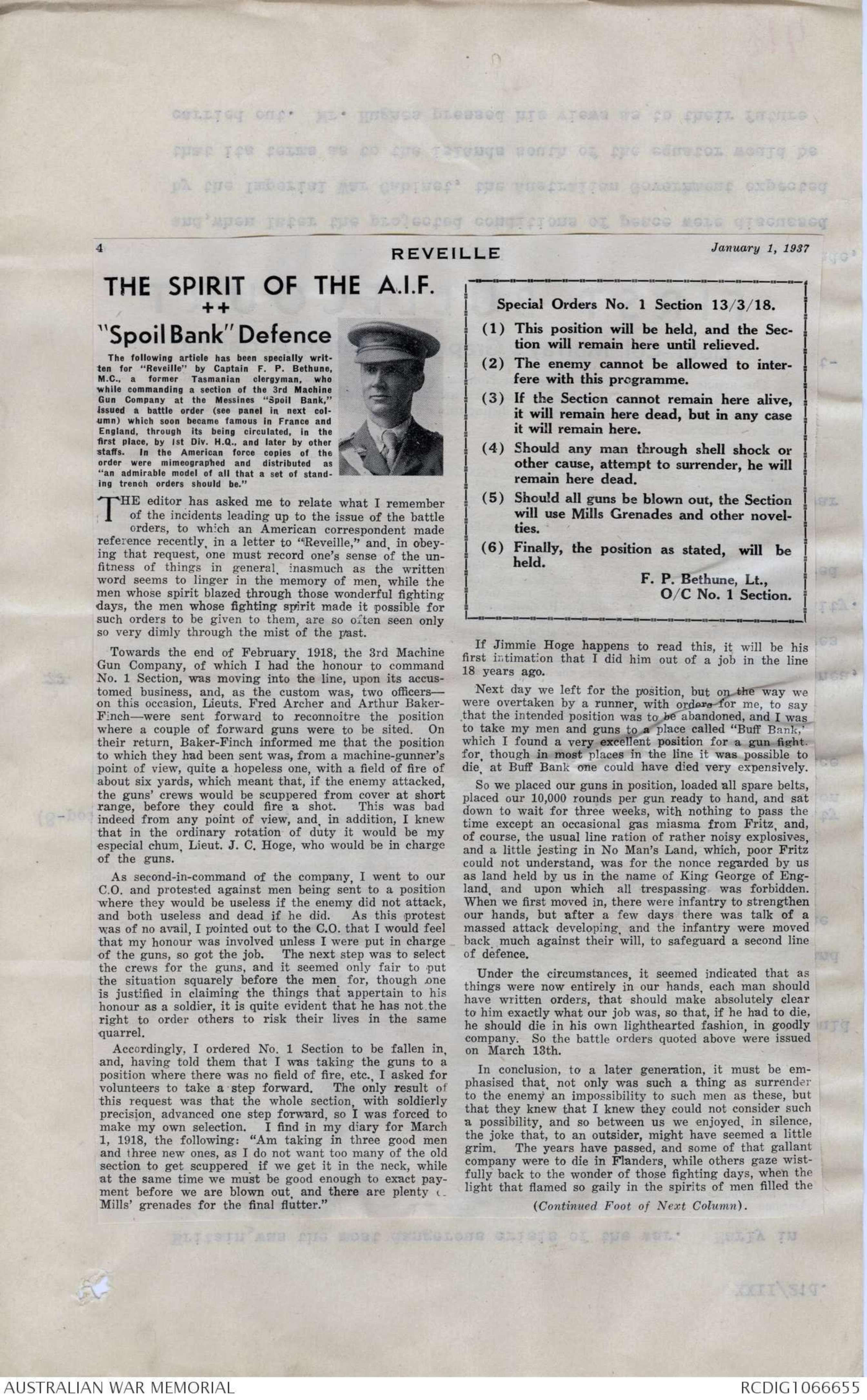
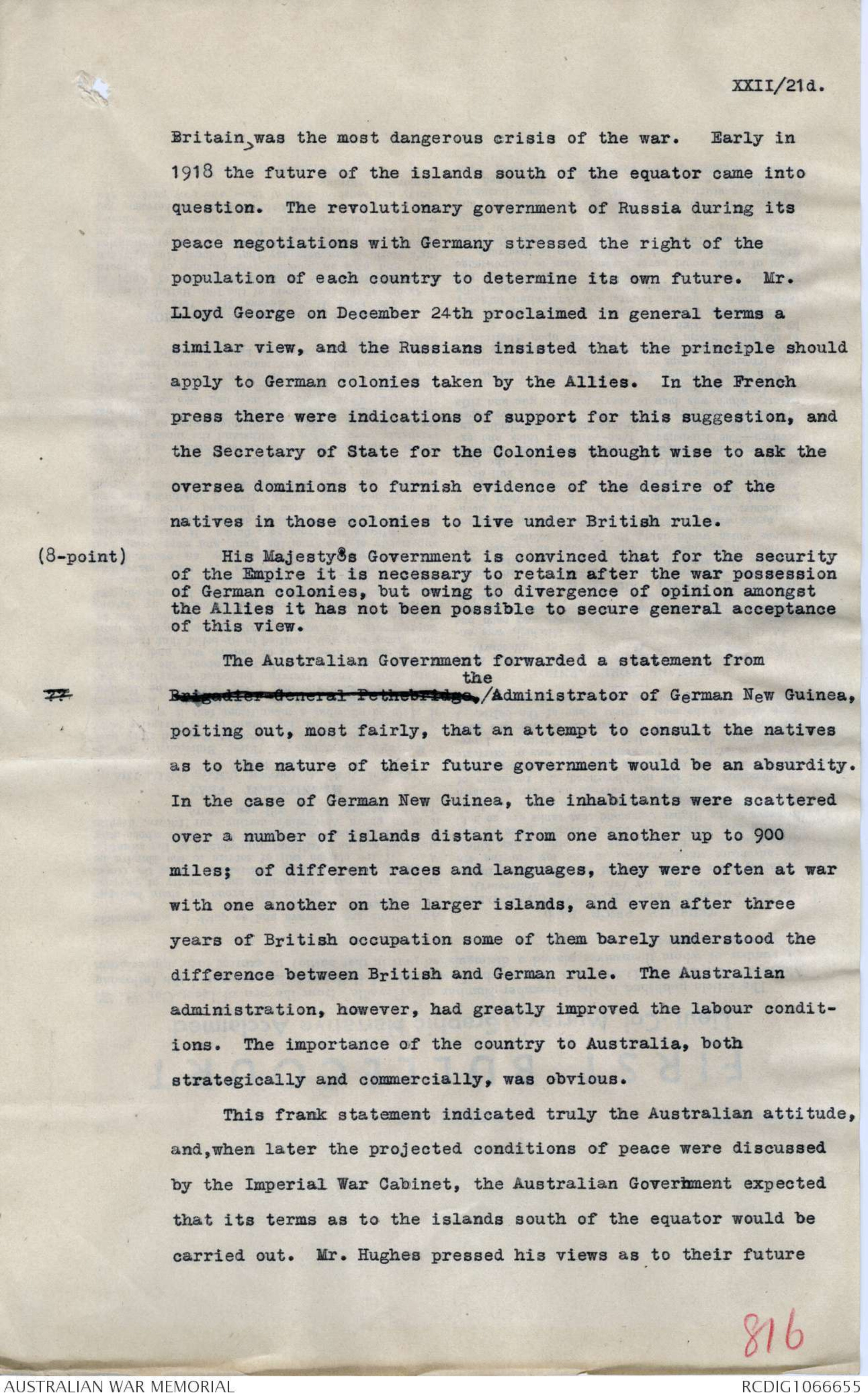
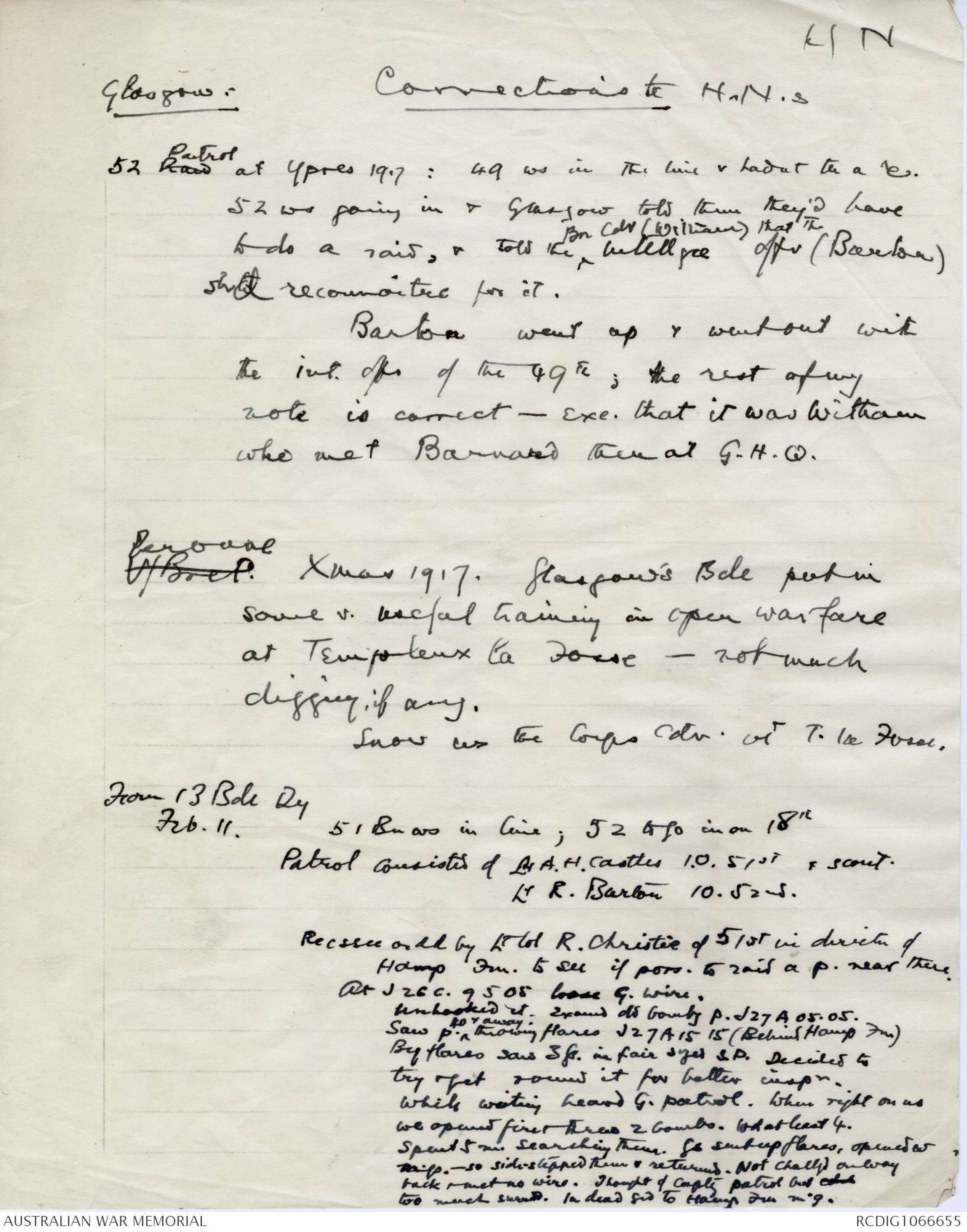
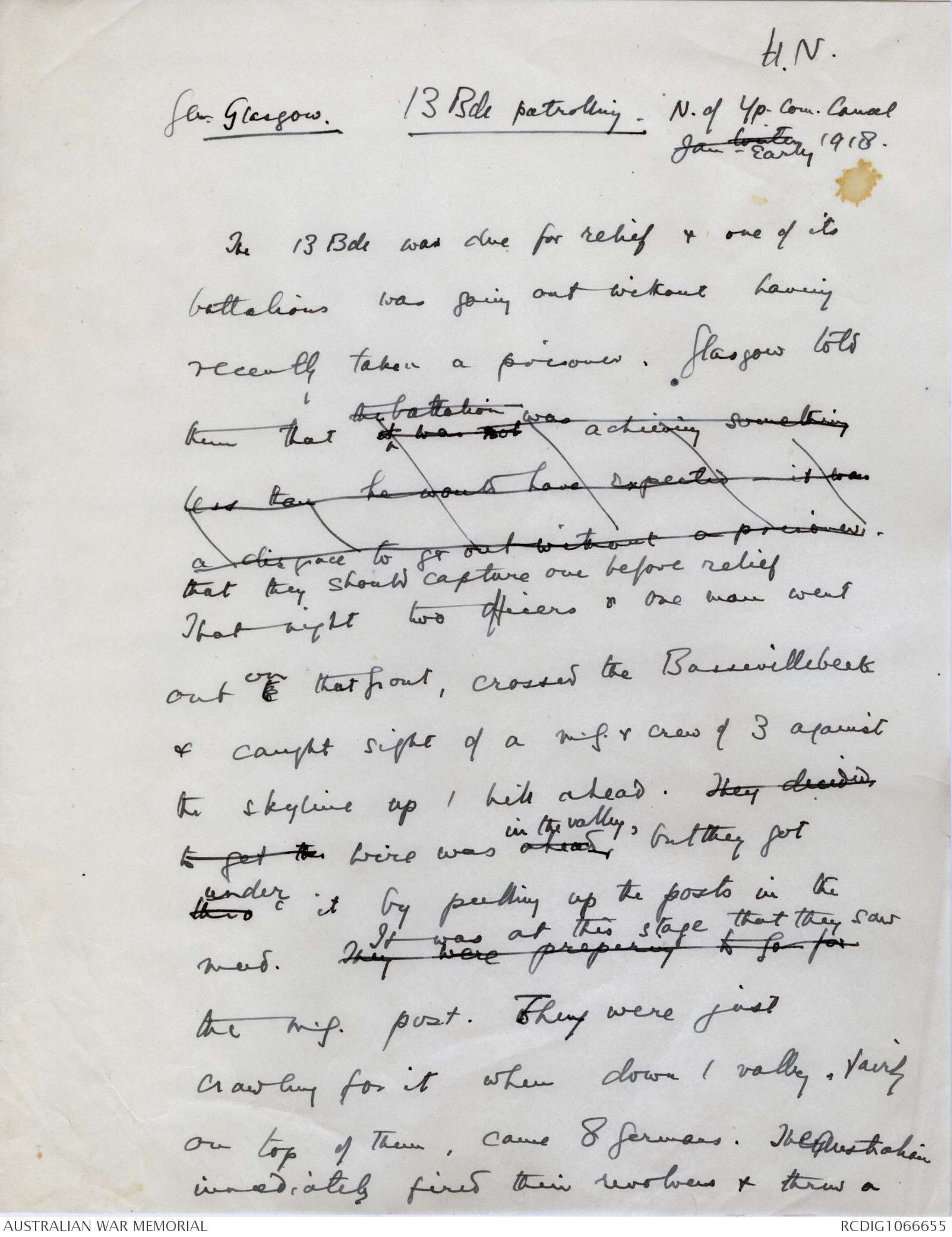
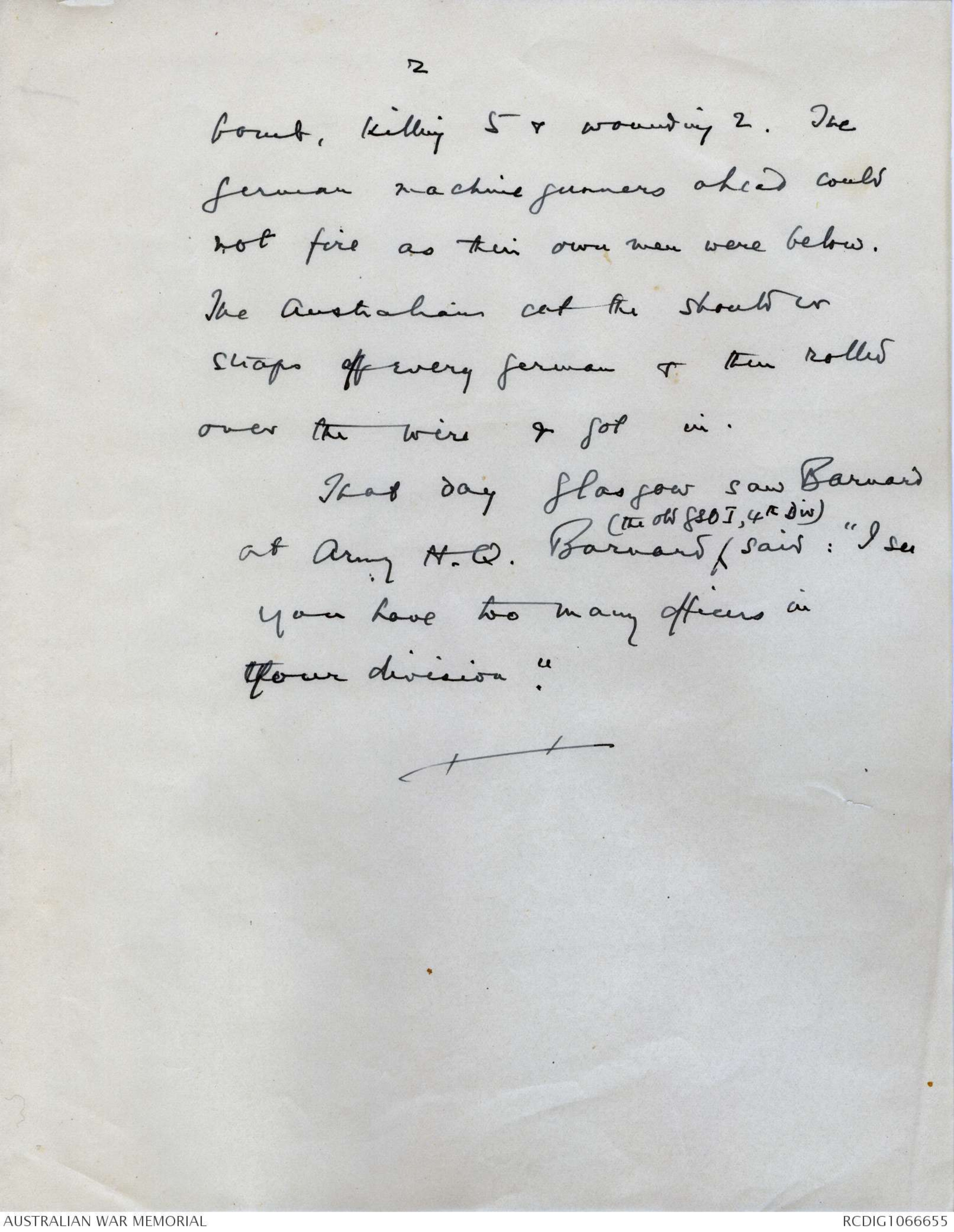
AWM No. 12/11/2279
8095.
2 August 1933.
Dear Major Treloar,
With regard to the order issued by Captain
F.P. Bethune, 3rd Machine Gun Company, in March 1918,
I enclose for your information a letter referring to it,
that we received from him early last year. With the
letter is a copy of the order in question, as well as
some cuttings from the Sydney press of recent date,
following on the publication of Thurlow's book. From
Bethune’s letter it seems clear that he was the man who
first issued the order.
I should be glad if you would kindly return
the file to me at your earliest convenience, since the
subject matter is being dealt with in an early chapter of
Volume V.
Yours sincerely,
Major J.L. Treloar, O.B.E.,
Australian War Memorial,
Box 214D, G.P.O.,
Melbourne.
256252
VOL. III CHAP. IX
Armentières. This place was chosen because the Germans
had been making a new trench (known as " The Breakwater")
closing a re-entrant and bringing their line much
closer to that of the New Zealanders. Photographs taken
from aeroplanes showed that certain other works, possibly
trenches for the assembly of troops about to attack, were in
progress behind the enemy's lines. This led General White
to infer that the Germans might be creating a " jumping-off "
position for a possible local attack, similar to those which they
had been making at Ypres.
The details of the enterprise by which this theory was to
be tested need not be related, except in so far as they differed
from those of the raids already described. The selected party
was trained with very great care; but unfortunately, when the
bombardment26 lifted, the gallant leader of the assault,
Captain Alley,27 dashing forward to enter the trench, was
mortally wounded by the burst of a New Zealand shell, the
same explosion wounding Lieutenant White,28 leader of the
right trench-party. A third officer, Lieutenant Espiner,29 was
hit before the commencement of the advance, which was thus
made under a heavy handicap. Nevertheless the new trench
was entered and found to be unfinished and destitute of any
regular garrison. Two listeners, or snipers, however, were
met with and bayoneted, and the party came upon four others,
all dead. No prisoners were secured, and the report of the
raiders did not, of course, definitely disprove the probability
of a German attack in the near future. But careful observations
made about the same time by the staff of the heavy
artillery showed that the enemy, though his guns had been for
a time more active, was not adding to his heavy pieces, but,
on the contrary, apparently withdrawing a few of them.30
————————————————————————
26The preparatory bombardment on this occasion lasted for twenty minutes.
27 Capt. E. B. Alley; and 2nd Bn., Otago Regt ; of , N.Z.:
b. . Died of wounds, 17 June, 1916.
28 Capt. A. T. White, M.C.; 2nd and Bn., Wellington Regt.; of
, N.Z.; b.
29 Lieut. R. H. Espiner; and 2nd Bn., Otago Regt. ; of , N.Z.;
b.
30 Possibly this was done in order to strengthen his artillery north of the Somme, where the projected English and French attack was about this time beginning to be apprehended by the enemy.
4 REVEILLE January 1, 1937
THE SPIRIT OF THE A.I.F.
++
Special Orders No. 1 Section 13/3/18.
(1) This position will be held, and the Section
will remain here until relieved.
(2) The enemy cannot be allowed to interfere
with this programme.
(3) If the Section cannot remain here alive,
it will remain here dead, but in any case
it will remain here.
(4) Should any man through shell shock or
other cause, attempt to surrender, he will
remain here dead.
(5) Should all guns be blown out, the Section
will use Mills Grenades and other novelties.
(6) Finally, the position as stated, will be
held.
F. P. Bethune, Lt.,
O/C No. 1 Section.
"Spoil Bank" Defence
The following article has been specially written
for "Reveille" by Captain F. P. Bethune,
M.C., a former Tasmanian clergyman, who
while commanding a section of the 3rd Machine
Gun Company at the Messines "Spoil Bank,"
issued a battle order (see panel in next column)
which soon became famous in France and
England, through its being circulated, in the
first place, by 1st Div. H.Q., and later by other
staffs. In the American force copies of the
order were mimeographed and distributed as
"an admirable model of all that a set of standing
trench orders should be."
The editor has asked me to relate what I remember
of the incidents leading up to the issue of the battle
orders, to which an American correspondent made
reference recently, in a letter to "Reveille," and, in obeying
that request, one must record one's sense of the
unfitness of things in general, inasmuch as the written
word seems to linger in the memory of men, while the
men whose spirit blazed through those wonderful fighting
days, the men whose fighting spirit made it possible for
such orders to be given to them, are so often seen only
so very dimly through the mist of the past.
Towards the end of February, 1918, the 3rd Machine
Gun Company, of which I had the honour to command
No. 1 Section, was moving into the line, upon its accustomed
business, and, as the custom was, two officers--
on this occasion, Lieuts. Fred Archer and Arthur Baker-Finch—
were sent forward to reconnoitre the position
where a couple of forward guns were to be sited. On
their return, Baker-Finch informed me that the position
to which they had been sent was, from a machine-gunner's
point of view, quite a hopeless one, with a field of fire of
about six yards, which meant that, if the enemy attacked,
the guns' crews would be scuppered from cover at short
range, before they could fire a shot. This was bad
indeed from any point of view, and, in addition, I knew
that in the ordinary rotation of duty it would be my
especial chum, Lieut. J. C. Hoge, who would be in charge
of the guns.
As second-in-command of the company, I went to our
C.O. and protested against men being sent to a position
where they would be useless if the enemy did not attack,
and both useless and dead if he did. As this protest
was of no avail, I pointed out to the C.O. that I would feel
that my honour was involved unless I were put in charge
of the guns, so got the job. The next step was to select
the crews for the guns, and it seemed only fair to put
the situation squarely before the men for, though one
is justified in claiming the things that appertain to his
honour as a soldier, it is quite evident that he has not the
right to order others to risk their lives in the same
quarrel.
Accordingly, I ordered No. 1 Section to be fallen in,
and, having told them that I was taking the guns to a
position where there was no field of fire, etc., I asked for
volunteers to take a step forward. The only result of
this request was that the whole section, with soldierly
precision, advanced one step forward, so I was forced to
make my own selection. I find my diary for March
1, 1918, the following: "Am taking in three good men
and three new ones, as I do not want too many of the old
section to get scuppered if we get it in the neck, while
at the same time we must be good enough to exact payment
before we are blown out, and there are plenty of
Mills' grenades for the final flutter."
If Jimme Hoge happens to read this, it will be his
first intimation that I did him out of a job in the line
18 years ago.
Next day we left for the position, but on the way we
were overtaken by a runner, with orders for me, to say
that the intended position was to be abandoned, and I was
to take my men and guns to a place called "Buff Bank,'
which I found a very excellent position for a gun fight,
for, though in most places in the line it was possible to
die, at Buff Bank one could have died very expensively.
So we placed our guns in position, loaded all spare belts,
placed our 10,000 rounds per gun ready to hand, and sat
down to wait for three weeks, with nothing to pass the
time except an occasional gas miasma from Fritz, and,
of course, the usual line ration of rather noisy explosives,
and a little jesting in No Man's Land, which, poor Fritz
could not understand, was for the nonce regarded by us
as land held by us in the name of King George of England,
and upon which all trespassing was forbidden.
When we first moved in, there were infantry to strengthen
our hands, but after a few days there was talk of a
massed attack developing , and the infantry were moved
back much against their will, to safeguard a second line
of defence.
Under the circumstances, it seemed indicated that as
things were now entirely in our hands, each man should
have written orders, that should make absolutely clear
to him exactly what our job was, so that, if he had to die,
he should die in his own lighthearted fashion, in goodly
company. So the battle orders quoted above were issued
on March 13th.
In conclusion, to a later generation, it must be emphasised
that not only was such a thing as surrender
to the enemy an impossibility to such men as these, but
that they knew that I knew they could not consider such
a possibility, and so between us we enjoyed, in silence,
the joke that, to an outsider, might have seemed a little
grim. The years have passed, and some of that gallant
company were to die in Flanders, while others gaze wistfully
back to the wonder of those fighting days, when the
light that flamed so gaily in the spirits of men filled
(Continued Foot of Next Column).
XXII/21d.
Britain, was the most dangerous crisis of the war. Early in
1918 the future of the islands south of the equator came into
question. The revolutionary government of Russia during its
peace negotiations with Germany stressed the right of the
population of each country to determine its own future. Mr.
Lloyd George on December 24th proclaimed in general terms a
similar view, and the Russians insisted that the principle should
apply to German colonies taken by the Allies. In the French
press there were indications of support for this suggestion, and
the Secretary of State for the Colonies thought wise to ask the
oversea dominions to furnish evidence of the desire of the
natives in those colonies to live under British rule.
[*(8-point)*] His Majesty's Government is convinced that for the security
of the Empire it is necessary to retain after the war possession
of German colonies, but owing to divergence of opinion amongst
the Allies it has not been possible to secure general acceptance
of this view.
The Australian Government forwarded a statement from
[*77*] Brigadier General Pethebridge, the/Administrator of German New Guinea,
poiting out, most fairly, that an attempt to consult the natives
as to the nature of their future government would be an absurdity.
In the case of German New Guinea, the inhabitants were scattered
over a number of islands distant from one another up to 900
miles; of different races and languages, they were often at war
with one another on the larger islands, and even after three
years of British occupation some of them barely understood the
difference between British and German rule. The Australian
administration, however, had greatly improved the labour conditions.
The importance of the country to Australia, both
strategically and commercially, was obvious.
This frank statement indicated truly the Australian attitude,
and, when later the projected conditions of peace were discussed
by the Imperial War Cabinet, the Australian Government expected
that its terms as to the islands south of the equator would be
carried out. Mr. Hughes pressed his views as to their future
816
H N
Glasgow : Corrections to H.N.s
52 Raid Patrol at Ypres 1917 : 49 ws in the line & hadnt tn a prisoner.
52 ws going in & Glasgow told them they'd have
to do a raid, & told the ^Bn Cdr (Witham) that the Intellgce Offr (Barton)
shd reconnoitre for it.
Barton went up & went out with
the int. offr of the 49th; the rest of my
note is correct - exc. that it was Witham
who met Barnard then at G.H.Q.
Peronne V/Bret Xmas 1917. Glasgow's Bde put in
some v. useful training in open warfare
at Templeux la Fosse - not much
digging, if any.
Snow ws the Corps Cdr. at T. la Fosse.
From 13 Bde Dy
Feb. 11. 51 Bn ws in line; 52 to go in on 18th
Patrol consisted of Lt A.H. Castles I.0. 51st & scout.
Lt R. Barton I0. 52nd.
Recssce ordd by Lt Col R. Christie of 51st in directn of
Hamp Fm. to see if poss. to raid a p. near there.
At J26C. 9505 loose G. wire.
Unhooked it. Examd old bombg p. J27 A 05.05.
Saw p. ^40y away, throwing flares J27 A15 15 (Behind Hamp Fm)
Big flares saw 3 Gs. in fair & yet S.P. Decided to
try & get round it for better inspn.
While waiting heard G. patrol. When right on us
we opened fire & threw 2 bombs. Wd at least 4.
Spent 5 m. searching them. Gs sent up flares, opened w
m.gs. -so side-stepped them & returned. Not challgd on way
back & met no wire. Thought of captg patrol but edrd
too much surrdd. In dead grd to Hamp Frm m.g.
H.N.
Gen Glasgow. 13 Bde patrolling. N. of Yp. Com. CanalJan-winter Early 1918.
The 13 Bde was due for relief & one of its
battalions was going out without having
recently taken a prisoner. Glasgow told
them that ^the battalion at was not was achieving somethingless than he would have expected - it wasa disgrace to go out without a prisoner.
that they should capture one before relief
That night two officers & one man went
out to on that front, crossed the Bassevillebeek
& caught sight of a m.g. & crew of 3 against
the skyline up / hill ahead. They decidedto get the Wire was ahead in the valley, but they gotthro under it by pulling up the posts in the
mud. They were preparing to go for It was at this stage that they saw
the m.g. post. Then were just
crawling for it when down / valley & fairly
on top of them, came 8 Germans. The Australian
immediately fired their revolvers & threw a
2
bomb, killing 5 & wounding 2. The
German machine gunners ahead could
not fire as their own men were below.
The Australians cut the shoulder
straps off every German & then rolled
over the wire & got in.
That day Glasgow saw Barnard
at Army H.Q. Barnard ^ (the old GSOI, 4th Div) said: "I see
you have too many officers in
your division."
 Maralyn K
Maralyn KThis transcription item is now locked to you for editing. To release the lock either Save your changes or Cancel.
This lock will be automatically released after 60 minutes of inactivity.